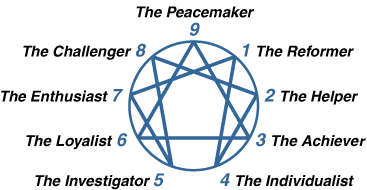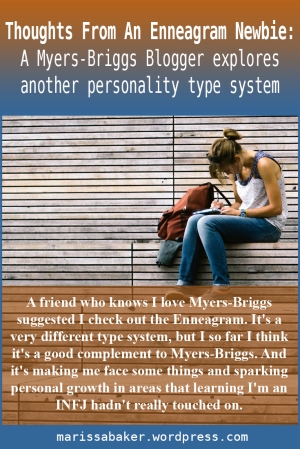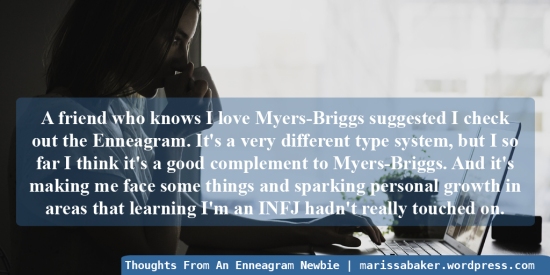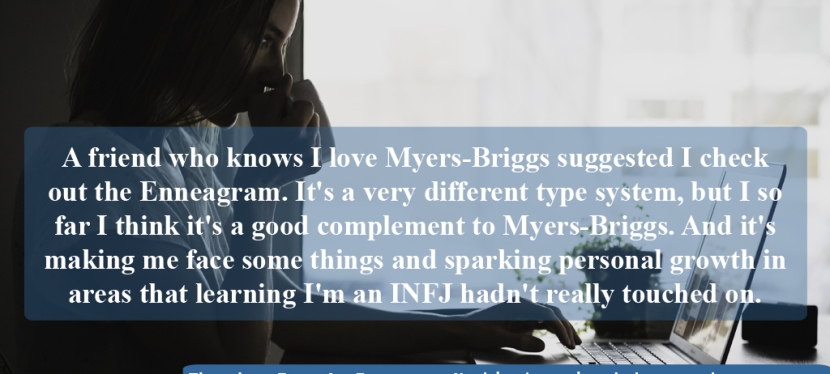Most of my readers find this blog looking for INFJ posts, so I’m sure many of you know I have a keen interest in personality types. Until very recently, my whole focus has been on the Myers-Briggs typing system. But someone finally convinced me to give the Enneagram a try. I was suspicious at first. It seemed strange, vague, largely negative, and not all that verifiable. Then I thought perhaps I hadn’t picked a good book to start with as my introduction and started prowling around online for recommendations.
And that’s how I found Discovering Your Personality Type: The Essential Introduction to the Enneagram by Don Richard Riso and Russ Hudson. These guys know how to write a personality type book. This particular one is a short little book that packs a whole lot of information in its 224 pages, including their type indicator questionnaire (you can either purchase the test online or get this book and do the paper version). They’ve also written other, more in-depth, books including one that I’m reading now.
What On Earth Is The Enneagram?
 The Enneagram of Personality Types is “a modern synthesis of a number of ancient wisdom traditions” originally put together by Oscar Ichazo (click here to read more). There are nine basic personality types and everyone is born with one type that dominates their personality.
The Enneagram of Personality Types is “a modern synthesis of a number of ancient wisdom traditions” originally put together by Oscar Ichazo (click here to read more). There are nine basic personality types and everyone is born with one type that dominates their personality.
Though your basic type doesn’t change, the Enneagram contains the possibility for quite a bit of variation within each type. For example, most people aren’t a “pure” version of their base type. They’ll also have some traits from one of their “wings,” the the type adjacent their type on the Enneagram (e.g. a 1 type can have a 9 or a 2 wing). Having two wings or no wings is fairly rare, but can happen.
The Enneagram also describes healthy, average, and unhealthy variations for each type. What Enneagram teachers call directions of integration and disintegration describe the ways each type responds when in a growth state or when under stress. The nine types are also grouped into three “centers” — the instinctive/gut types (8, 9, 1), the feeling/heart types (2, 3, 4), and the thinking/head types (5, 6, 7). And that’s just a super-brief overview of how deep you can go with the Enneagram (click here for a more complete introduction).
So What Type Are You?

If you want to discover your Enneagram type, you can find some tests online or get a copy of Discovering Your Personality Type (I’d recommend the book; you can probably find it in the library). I’d taken a few Enneagram tests online several years ago just for fun, but didn’t quite know what to do with the results. Interestingly, the more thorough test in this book gave me the same results as those tests: 4w5. I also score very high on 9 traits, for some reason, though I’m sure from reading the descriptions that it’s not my type.
Type 4 goes by the nickname “The Individualist” or “The Romantic” (depending which teacher you read). Riso and Hudson briefly describe them as “The Expressive, Dramatic, Self-Absorbed, Temperamental Person” (ouch — are any of those supposed to be positive traits?). My 5 wing means I also have some characteristics of “The Investigator” or “The Perfectionist.” They’re described as “The Perceptive, Innovative, Secretive, Isolated Person.”
It’s been interesting to compare 4 traits with my INFJ personality type (4w5 seems to be one of the more common Enneagram types for INFJs and INFPs, though certainly not the only option). I’m realizing some of my traits might not have nearly as much to do with being INFJ as they do with being a type 4. For example, most INFJs report having a rich inner world and many will say that they can become preoccupied with fantasy. But there’s really nothing in an INFJ’s mental wiring that would send this type and only this type into a daydreaming spiral that makes it difficult for them to interact with the outer world. Withdrawing to fantasy and losing oneself in imagination is, however, a trait of Enneagram 4s. In fact, Riso and Hudson describe it as their “characteristic temptation.”
How Does It Compare To Myers-Briggs?
Myers-Briggs describes how our minds work — the primary ways we make decisions and gather and process information. The Enneagram, on the other hand, seems more focused on getting to the core of an individual’s passions, fears, motivations, obsessions, and virtues. Here are some articles I found that discuss and compare the two systems:
- Enneagram vs. Myers-Briggs/MBTI: Key Differences
- Enneagram, Myers-Briggs & the Inferior Function: Healthy Type Correlations
- Understanding The Enneagram (From A Myers-Briggs Expert)
- Here Are The Most Common Enneagram Types For Each Myers-Briggs Personality Type
- “Debunking” the Myers-Briggs: Enneagram Implications
The two systems describe different aspects of personality and it seems they complement each other quite well to get a more in-depth look at yourself and other people. One key difference I’ve noticed is how it feels when you initially discover your type. Since Myers-Briggs describes how your mind works, the initial response to learning your type is often, “Wow — someone understands me! That’s so cool.” Myers-Briggs can help you discover some of the weaknesses of your type and act as a tool for personal growth, but the basic descriptions are largely positive.
The Enneagram also looks at healthy and unhealthy versions of each type, but learning your Enneagram isn’t always as validating as learning your Myers-Briggs type. My reaction to reading the type 4 description was more like, “Oh. They know my deepest weaknesses, fears, and temptations. I don’t like myself.” Further reading brings out that the Enneagram also talks about healthy versions of the type, growth opportunities, and things like that, but that initial reaction wasn’t as comfortable as learning I was an INFJ. I think it’s going to be very helpful, though, for personal growth.
What do you think, Dear Reader? Have you looked into both personality type systems, or do you just stick with one? If you’ve studied both, what do you think of them?


Love your post! I recently became very interested in the enneagram as well. In fact, I may also write a post about it in the near future. Type 4 makes a lot of sense for an INFJ! I’m a 2w1 which I think is due to my strong extroverted feeling and the emphasis that I put on it as a teacher. Also, my mom is an ESFJ and a Type 2 and has had a big influence on my life. I’ve had 3 other INFJ friends take the Enneagram and they were Types 1, 2, and 9. A friend of mine suggested that MBTI is more nature and the Enneagram is more nurture. This may be why people of the same Myers Briggs type can get such different results. Thanks for sharing your thoughts!
LikeLiked by 1 person
Thanks Hannah!
LikeLike
Hey Marissa! Your post has encouraged me me to look into this whole enneagram business 😉Thanks
LikeLiked by 2 people
You’re welcome 🙂
LikeLike
I’ve been waiting for this post! I recently learned about the enneagram and it has changed my life. I, too, am an INFJ. Online enneagram tests routinely scored me as a strong 4w5, but something about it seemed more INFP and not totally me, though I find 4w5 very appealing. After more studying (which was mostly listening to The Road Back to You podcast), I woke up one morning and instantly realized I was a One (I must have been processing it in my sleep (Ni?)). One was the type I did *not* want to be; but I’ve accepted it and learned a lot about what motivates me and why I struggle with certain things. I hadn’t realized there were different types of perfectionists. I can put up with systems being imperfect, but what drives me is moral perfection in myself, as well as what I do in relation to others (conversing, accompanying singing during worship services on the piano, etc) . All of my life I have struggled tremendously with people accusing me of false motives. Sometimes it would take months of being consumed with what someone accused me of that wasn’t true before I was able to move on, and I now realize it’s because of the perfectionism for which I strove seemed tainted by others’ false accusations. I could not live with others thinking I sinned in ways I hadn’t. I knew that God knew my heart, and that was comforting, but I could not figure out why the accusations consumed me. Now I know! God put the enneagram into my life at just the right time, and the knowledge has been freeing. Now when I freeze while attempting small talk, I know it’s my inner perfectionist saying I can’t converse well enough to interest people, and I shut it off. It’s also helped me to understand my Mother, who is an Eight. Eights’ confrontational style does not need to intimidate me: it’s just their style, and it’s usually not something to take personally.
I am very interested in followup posts from you on the enneagram. Thanks for sharing what you’ve learned!
LikeLiked by 1 person
It’s funny now Ni works. I love it when brilliant answers/insights just seem to come out of nowhere! I’m glad God led you to the enneagram when it would be most helpful. I love hearing stories like that 🙂 And thanks for your kind words about my post — I’ll definitely plan to write more about the enneagram as I keep looking into it.
LikeLike
I’ve been interested in looking into enneagram but I haven’t had the time or inclination to do any research on either typing system. From the little I know, I think I’m a 5w4, which makes sense for an INTP.
LikeLiked by 1 person
5w4 does sound like it would be a likely type for an INTP (not that I know much more about the enneagram system than you do).
LikeLike
I love both of them. I discovered MBTI first and had that wow moment. It took me a while to warm up to the Enneagram but once I did there was so much depth to it that helped me understand more subtle aspects of myself. Definitely see them both as useful and complimentary to each other.
LikeLiked by 1 person
The depth is one thing I really like about the Enneagram, too. It’ll take some time for me to feel as comfortable with it as I do with Myers-Briggs, but I’m starting to see how it will be really useful
LikeLike
Reblogged this on breakitlikeyana and commented:
Both Myers Briggs and the Enneagram Personality Tests had significantly impacted my life, especially in terms of self awareness and resolving past & present issues.
LikeLike
I am also an infj and type 4. This was very interesting to read, thanks for sharing
LikeLiked by 1 person